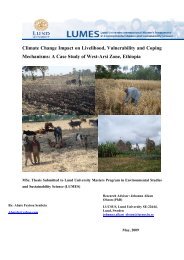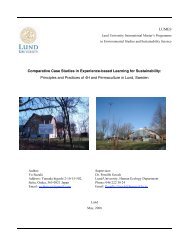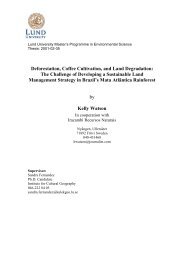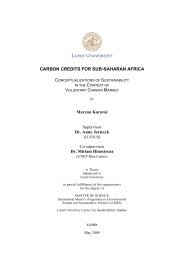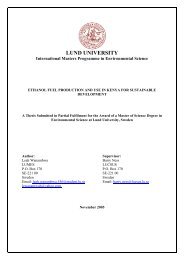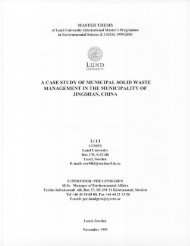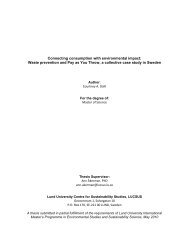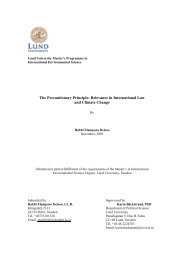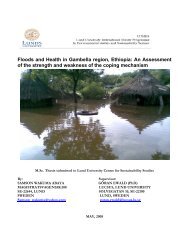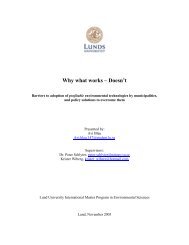Thesis title: âThe development of community-based ecotourism - lumes
Thesis title: âThe development of community-based ecotourism - lumes
Thesis title: âThe development of community-based ecotourism - lumes
Create successful ePaper yourself
Turn your PDF publications into a flip-book with our unique Google optimized e-Paper software.
governmental control by increasing self-regulation, while, from the other side,consumers are provided with useful information concerning certified tourism productsand services (Issaverdis, 2001). Due to these reasons, the concept <strong>of</strong> certification hasattracted significant attention both within the academic <strong>community</strong> and the tourismindustry and has generated general optimism with regard to its potential to helpachieve sustainability in the tourism sector (Fennel, 2002).In particular, certification is believed to have the potential to decrease theadverse environmental and social impacts <strong>of</strong> tourism, by making the tourism industryassume its responsibilities and by providing marketing benefits to companies thatmeet specific standards (Font et al., 2003). However, one <strong>of</strong> the most importantlimiting factors for the widespread success <strong>of</strong> certification programmes is theirrelatively poor uptake by the tourism industry worldwide (Synergy, 2000 for WWF-UK). Further, the success <strong>of</strong> tourism certification in many countries, Greece not beingan exception, depends largely on governmental support in terms <strong>of</strong> funding,assessment and recognition (Valerga, 2004, personal communication). Actually, it hasbeen estimated that without such support from the State, two-thirds <strong>of</strong> tourismcertification schemes would not even manage to survive, let alone be successful (Font& Bendell, 2002, as cited in Bendell & Font, 2004). This is because the relativelyhigh costs make certification unequally accessible to different tourism companies. Asa result, there are certain cases where the cost <strong>of</strong> certification might even becomeprohibitive, particularly in countries that do not have a national certification programin place (Sasidharan et al., 2002).In total, certification constitutes an effective mechanism for the companiesthat wish to demonstrate high standards <strong>of</strong> performance beyond legislation, as well asa marketing advantage that allows them to stand out from the average and becomemore competitive. In this sense, certification is a valid instrument for defining newways that will contribute to raising tourism standards and thus advancing towards thedirection <strong>of</strong> more sustainable tourism. Some researchers contend, though, thatcertification is more adequate in certain cases than in others. In particular, it is a toolmostly appropriate for countries that already possess a well-established infrastructureand strong economic background in order to support and promote certificationeffectively. It is also an instrument especially suited for economically potentcompanies that wish to move beyond the level <strong>of</strong> basic needs, by incorporatingsustainability concerns and enhancing their market pr<strong>of</strong>ile (Font, 2004).Although in some cases the terms “accreditation” and “certification” areperceived as synonymous and are used interchangeably, which only adds to thealready existing confusion (Font, 2002), most experts agree that there is a cleardistinction between them; in particular, the term “accreditation” is defined as “theprocedure by which an authoritative body formally recognizes that a certifier iscompetent to carry out specific tasks. In other words, an accreditation programmecertifies the certifiers” (Honey & Stewart, 2002, pp. 5-6). Another definition <strong>of</strong> thesame term is provided by Bendell and Font (2004): “accreditation is the process <strong>of</strong>assessing the capacity to certify. Accreditation bodies audit the auditors and theircapacity to certify companies and/or products. […] Through accreditation,certification entities can demonstrate their capacity to undertake certification and,thus, build credibility around their systems” (p. 47).It is believed that accreditation could provide a viable solution to theconfusion generated by the increasing number <strong>of</strong> certification schemes on the globallevel. In particular, an internationally recognised accreditation system could set globalstandards for making different certification programmes comparable, as well as for13



